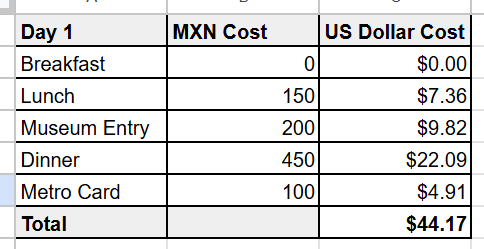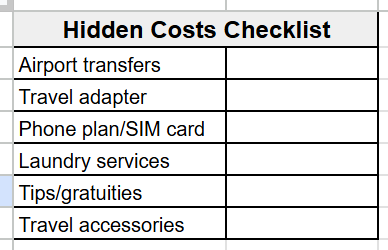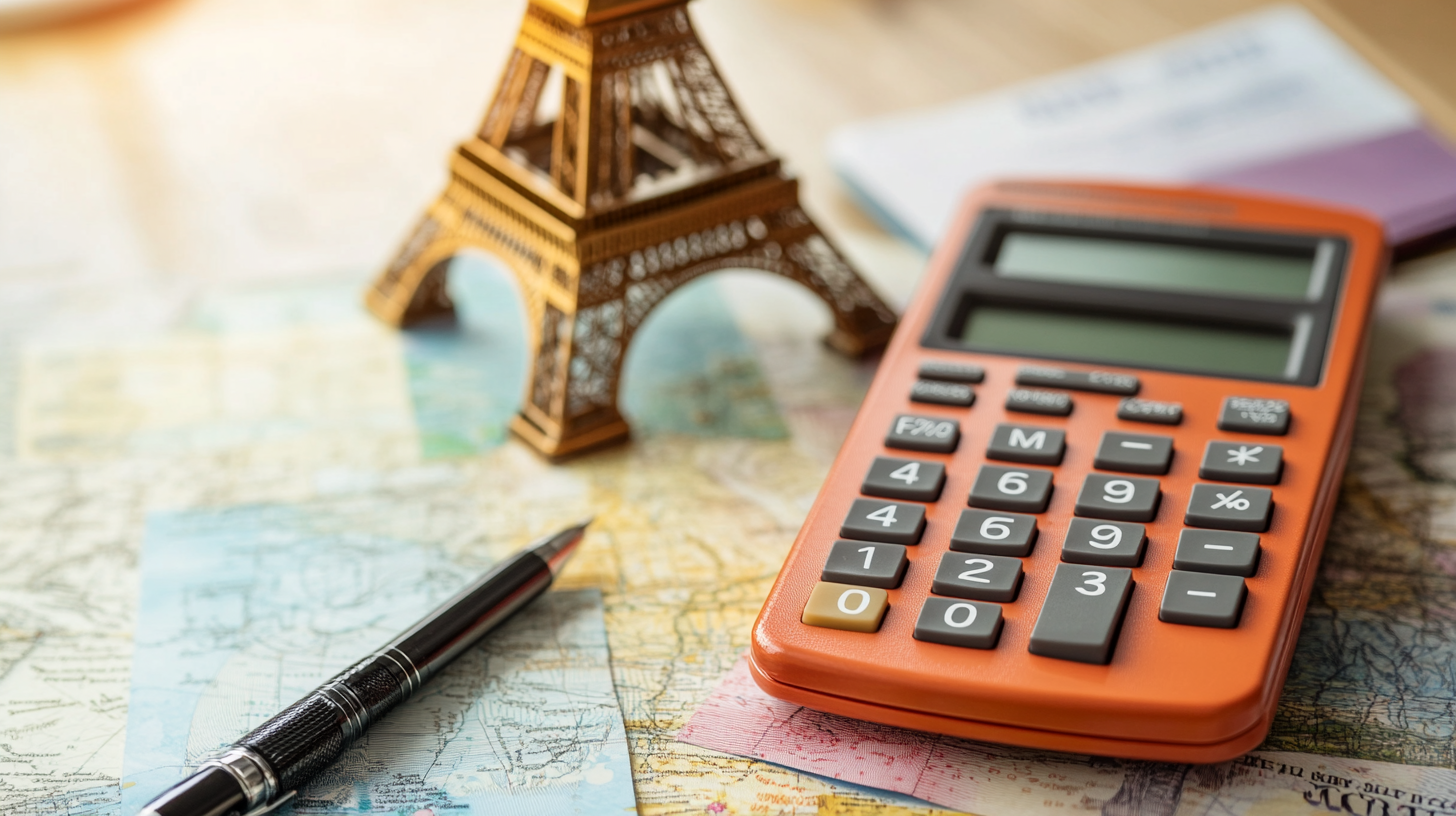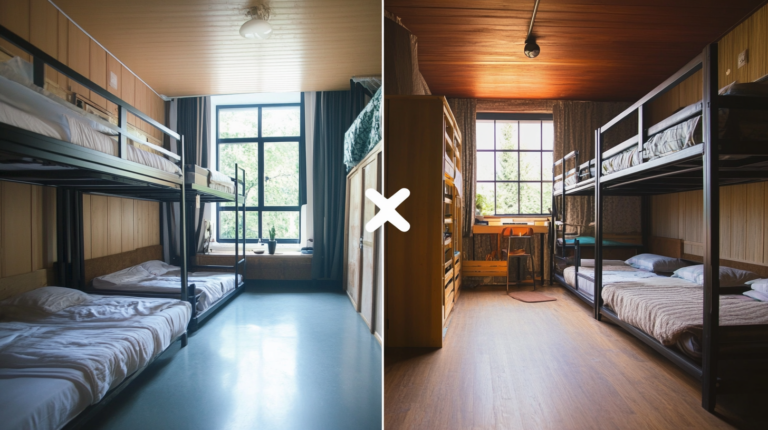Travel Budget Calculator: Plan Your Trip Expenses Like a Pro
Did you know that 68% of travelers exceed their vacation budget due to overlooked expenses? I’ve been there too! Whether you’re planning a weekend getaway or a round-the-world adventure, having a reliable travel budget calculator can mean the difference between a stress-free journey and constant money worries. Let’s dive into everything you need to know about calculating your travel costs accurately and planning your dream trip without breaking the bank!
Understanding the Basics of Travel Budget Calculation
Let me tell you about my first big travel budgeting mistake – I completely forgot about baggage fees when planning my Thailand trip! I’d spent hours meticulously planning my hotel costs and activities, only to get hit with $150 in unexpected airline fees right off the bat. Talk about starting a vacation stressed out!
After 15+ years of traveling (and plenty of budget blunders), I’ve finally nailed down a foolproof system for calculating travel costs. Here’s the real deal on what you need to track, and trust me, it’s way more than just flights and hotels.
First up, let’s break down your expenses into two main buckets: fixed and variable costs. Your fixed costs are like your “must-pays” – flights, accommodation, travel insurance (please don’t skip this!), and any pre-booked tours. These usually eat up about 70-80% of your total budget. Variable costs are your day-to-day stuff: meals, local transportation, souvenirs, and those spontaneous decisions to take a cooking class or rent a jet ski.
One important tip I learned the hard way? Always, and I mean always, build in a 15-20% buffer for unexpected expenses. Last summer, a transit strike in Paris meant I had to take taxis instead of the metro for three days straight. Without my trusty buffer fund, that could’ve been a real headache!
Let’s talk tools because they’re absolute lifesavers. I swear by Tripcoin for tracking expenses on the go – it works offline and handles multiple currencies like a champ. For pre-trip planning, I’ve created a spreadsheet template that I’m happy to share (click here for the travel budget calculator template). It’s nothing fancy, but it’s helped me plan over 30 trips without any major financial surprises.
Here’s a quick breakdown of how I allocate a typical $3000 one-week vacation budget:
- Transportation (including flights): 35% ($1050)
- Accommodation: 30% ($900)
- Food and drinks: 15% ($450)
- Activities and entertainment: 10% ($300)
- Buffer fund: 10% ($300)
The biggest mistake I see folks make? Forgetting about all those sneaky little expenses that add up fast. We’re talking ATM fees (usually $3-5 per withdrawal), tipping in different countries (can vary from 0-20%), data plans ($10-50 depending on destination), and even seemingly small things like bottled water or public bathroom fees in Europe (usually €0.50-1 per use!).
Listen, I know budget planning isn’t exactly the most exciting part of travel prep. You’d probably rather be browsing Instagram for cool photo spots or planning your itinerary. But I can’t tell you how many times I’ve seen people’s dream vacations turn stressful because they didn’t crunch the numbers properly beforehand.
Remember that Thailand trip I mentioned? Well, after that wake-up call, I developed what I call the “triple-check system.” I estimate all costs once, wait a day, do it again with fresh eyes, then run my numbers by an experienced traveler friend. It might sound like overkill, but it’s caught potential budget busters more times than I can count!
The bottom line? A solid travel budget isn’t about limiting your fun – it’s about giving yourself the freedom to enjoy your trip without constantly worrying about money. Take it from someone who learned the hard way: a little planning goes a long, long way.
Transportation Cost Planning Made Simple
You know what’s wild? I once spent more money getting to and from the airport than I did on my actual flight to Barcelona! That’s when I realized I needed to get serious about transportation planning – not just the big ticket items, but every single way I’d be moving from point A to point B.
Let me spill some real tea about finding flight deals. Everyone talks about that “Tuesday at midnight” booking rule, right? Well, in my experience, it’s less about specific days and more about booking windows. I’ve found the sweet spot is typically 3-4 months out for international flights, and 6-8 weeks for domestic. But here’s the game-changer: I use Google Flights’ price tracking feature religiously. Last month, it saved me $247 on a flight to Tokyo just by waiting three days!
The real secret sauce to transportation budgeting? It’s planning your ground transport before you even take off. I learned this lesson the expensive way in London. I showed up thinking “I’ll just take taxis when I need them.” Ha! Three days and £200 later, I finally got smart and bought an Oyster card for the Tube.
Here’s my actual breakdown of transportation costs from a recent 10-day trip to Europe:
- Flight: $612 (found using price alerts)
- Airport transfer: $42 (pre-booked shuttle instead of taxi – saved $35)
- Local transportation pass: $68 (10-day unlimited)
- Day trip train tickets: $89 (bought 2 months in advance)
- Emergency taxi fund: $50 (only used $23!)
Total: $861 (about 29% of total trip budget)
One thing that totally changed my approach to transport planning was creating what I call “connection maps.” Before any trip, I map out exactly how I’ll get between every major point: airport to hotel, hotel to main attractions, day trip routes. It sounds obsessive, but trust me – this prevents those panic-spending moments when you’re tired, lost, and willing to pay anything for an Uber.
Hidden fees? Oh boy, do I have stories! Did you know some budget airlines charge up to $45 just to print your boarding pass at the airport? Or that some train tickets in Europe are actually cheaper if you book them in split segments? I keep a running list of these sneaky charges in my travel planning doc – everything from fuel surcharges to bicycle fees on trains.
For rental cars (which can be budget-busters if you’re not careful), I’ve developed a simple rule: always calculate the true daily cost. That means rental fee + insurance + gas + parking + tolls. I once “saved” $15/day on a cheaper rental in Miami, only to spend twice that amount on mandatory valet parking at my hotel. Lesson learned!
Here’s a pro tip that’s saved me hundreds: many cities offer transportation passes that include free museum entry or attraction discounts. The Paris Museum Pass, for example, includes unlimited public transport and skip-the-line access to major sites. When you factor in individual ticket costs and transportation, these passes often pay for themselves by day two.
The absolute best money-saving transportation hack I’ve discovered? Walking tours! Not only do you get amazing local insights, but guides always share tips about navigating public transport and which tourist traps to avoid. Plus, you get your bearings in a new city while burning off all those croissants. Win-win!
Accommodation Budget Strategies
Want to know my biggest accommodation face-palm moment? I once booked what looked like a gorgeous apartment in Paris, only to discover I’d accidentally reserved it for the wrong month! The cancellation fee was brutal, and that expensive lesson taught me to triple-check every single booking detail.
Let me break down the real deal about accommodation costs, because this is where I see most travelers either overspend or end up in less-than-ideal situations. After booking places in over 30 countries, I’ve learned that timing is everything. Did you know that booking a hotel in shoulder season (like May or September in Europe) can save you up to 40% compared to peak summer rates? I snagged a room at a fancy hotel in Venice for €120 instead of the usual €300 just by visiting in late October!
Here’s a practical example of how I budget for a typical week-long stay:
- High-end city: $200-250/night (think Paris, Tokyo, New York)
- Mid-range city: $120-180/night (like Barcelona, Bangkok, Berlin)
- Budget destination: $50-100/night (such as Prague, Mexico City, Bali)
These are averages for decent mid-range hotels or nice Airbnbs – not hostels or luxury resorts.
One strategy that’s saved me thousands? The mixed accommodation approach. On a recent 10-day trip to Japan, I did this:
- 3 nights in a higher-end hotel in Tokyo ($750)
- 4 nights in a traditional guesthouse in Kyoto ($400)
- 3 nights in a budget business hotel in Osaka ($240)
Total: $1,390 – about $139/night average
Speaking of negotiating better rates (yes, it’s totally possible!), here’s what actually works: First, email the property directly. I got a 15% discount at a boutique hotel in Morocco just by mentioning it was my first visit to the country and asking if they had any special rates. For longer stays (a week or more), always ask about extended stay discounts. One place in Greece knocked off 30% for my 10-day booking!
Let’s talk about hidden costs because they can wreck your budget faster than you can say “resort fee.” Watch out for:
- Tourist taxes (up to €7 per person per night in some European cities)
- Parking fees ($30-50 per day in major cities)
- Breakfast charges (often not included, despite what booking sites suggest)
- Service charges (especially common in luxury hotels)
- Credit card foreign transaction fees
Here’s a game-changing tip I stumbled upon: many hotels offer unadvertised “day of” rates. If you’re flexible and don’t mind booking last minute, apps like HotelTonight can score you fancy rooms for budget prices. I once got a $400/night hotel in Chicago for $150 using this method!
The location vs. price debate is real, y’all. I used to automatically book the cheapest decent-looking place I could find. Big mistake! Now I calculate the total cost including transportation. That $50/night difference between a city center hotel and one in the suburbs often evaporates when you factor in daily taxi or transit costs. Plus, you’re wasting precious vacation time on commuting.
One more thing about seasonal variations – they’re not just about summer versus winter. Always check if your dates coincide with major local events or festivals. On my 29th birthday, I got stuck paying over $300/night for a crappy hotel on South Beach when I should have paid $78/night!
Your accommodation sets the tone for your entire trip. While I’m all for saving money, I’ve learned that this isn’t the place to cut corners too drastically. Nothing ruins a vacation faster than a terrible night’s sleep or feeling unsafe in your neighborhood. Budget accordingly, but don’t sacrifice basic comfort – your future traveling self will thank you!
Food and Entertainment Expense Planning
You want to hear about a rookie travel budgeting mistake? My first trip to Italy, I figured I’d spend about $30 a day on food. Ha! After my first authentic Italian dinner with wine, I realized I’d blown through an entire day’s food budget in one sitting. That’s when I learned that food and entertainment costs can make or break your travel budget faster than you can say “gelato”!
Let me share my tried-and-true system for estimating food costs. First, I hop onto TripAdvisor or TheFork and check out menu prices at a mix of restaurants in my destination – from street food to mid-range spots. For example, in Rome, I found that:
- Casual lunch with pasta and drink: €15-20
- Nice dinner with wine: €35-50
- Quick breakfast at a cafe: €5-8
- Gelato (because, priorities!): €3-5
Here’s how I typically break down a daily food budget in a mid-range European city:
- Breakfast: $8-12 (or free with hotel)
- Lunch: $15-20
- Dinner: $30-45
- Snacks/drinks: $10-15
Total: $63-92 per day
One of my favorite money-saving strategies? The “two-thirds rule.” I eat breakfast at my accommodation (if included), grab something quick and local for lunch, then splurge on a nice dinner every two or three days. On other nights, I’ll do picnics or casual local spots. This approach saved me nearly $200 during a week in Paris!
Now, let’s talk about entertainment because this is where budgets often go sideways. I’ve learned to research attraction costs like I’m planning a military operation. Did you know many museums in Europe have free admission days? The Louvre is free on the first Sunday of each month! I keep a spreadsheet of these money-saving hacks for every city I visit.
Here’s a real example of my entertainment spending for a week in Barcelona:
- Sagrada Familia ticket (booked online in advance): €26
- Park Güell: €10
- Walking tour (tip-based): €15
- Flamenco show: €35
- Various museums: €40
- Local festival (free!): €0
Total: €126 (about €18 per day)
The best way to see everything at a discount? City passes! But here’s the trick – don’t just buy them automatically. I calculate the individual costs of what I actually plan to see and compare it to the pass price. In London, the City Pass saved me £52 over four days. In Prague? Individual tickets were cheaper for what I wanted to do.
One thing that always surprises first-time travelers is the cost of “local” experiences. Those authentic cooking classes and wine tours? They’re amazing but can get pricey! I budget about 25% of my entertainment funds for one or two special experiences like this. The memories are totally worth it, but you need to plan for them.
Let me share my favorite budget-friendly entertainment hacks:
- Follow local event pages on Facebook for free festivals and events
- Check if your hotel offers free walking tours
- Look for “pay what you wish” museum hours
- Download city apps that alert you to free cultural events
- Check university venues for cheap concerts and shows
It is always a good idea to make friends with locals or hostel staff! They’ve helped me find amazing hole-in-the-wall restaurants and local hangouts that cost a fraction of tourist spots. Plus, they know which “must-try” places are actually worth your money and which are tourist traps.
Food and entertainment aren’t just expenses – they’re a huge part of why we travel in the first place! The goal isn’t to be cheap, it’s to be smart about where you spend. I’d rather have one amazing local meal than three mediocre tourist-trap dinners. It’s all about prioritizing what matters most to you and planning accordingly.
And please, please set aside a “spontaneous fun fund.” Some of my best travel memories came from unplanned experiences – like the time I splurged on an impromptu food tour in Bangkok or joined a midnight kayak trip in Puerto Rico. Having that flexibility in your budget means you can say “yes” to unexpected adventures!
Creating Your Personalized Travel Budget Calculator
Let me tell you about my spreadsheet evolution! I started with the most basic Excel doc imaginable – literally just “Flights” and “Hotels” columns. After a particularly expensive trip to Japan where I somehow spent double my budget, I realized I needed something way more comprehensive. Seven years and countless trips later, I’ve finally perfected my travel budget template, and I’m excited to share exactly how I built it.
First things first – forget those generic templates you find online. They’re a good starting point, but every traveler’s needs are different. My current spreadsheet has evolved based on hard-learned lessons. Like that time I forgot to include ATM fees in Southeast Asia and racked up $75 in charges alone! Now I have a dedicated “Banking Fees” column that’s saved me hundreds.
Here’s the exact structure of my master travel budget template:
(click here for the travel budget calculator template)
Pre-Trip Fixed Costs:
- Flights (including baggage fees!)
- Accommodation deposits
- Travel insurance
- Visa fees
- Vaccination costs
- Essential gear/clothing
Daily Variable Costs:
- Accommodation balance
- Transportation (broken down by type)
- Food (breakfast/lunch/dinner/snacks)
- Activities/entrance fees
- Shopping/souvenirs
- Emergency fund (10% of daily budget)
One awesome feature I’ve added? A currency conversion tab that automatically updates based on current exchange rates.
For Euros, I use this formula: =GoogleFinance(“CURRENCY:USDEUR”)
This pulls real-time rates and adjusts my budget accordingly. No more mental math while trying to figure out if that Paris dinner is actually within budget!
The tracking part is crucial, and I learned this the expensive way. I now use a combination of tools:
- Main spreadsheet for planning
- Trail Wallet app for daily expenses
- Notes app for quick receipt photos
- Digital wallet for tracking card expenses
Here’s a real example of how I tracked a recent 5-day trip to Mexico City:
Day 1 spending:

Total: 900 MXN ($45) vs. budgeted 1200 MXN ($60)
Pro tip: I always add a “buffer” column to each category. Why? Because things rarely go exactly as planned. That awesome street food market you budgeted $15 for might turn into a $50 food tour when you meet some cool travelers who invite you along. Having that flexibility built into your template means you can say yes to spontaneous opportunities!
The most valuable section in my template? The “Lessons Learned” tab. After each trip, I note down what I over/under budgeted for. For instance, I learned that I consistently underestimate snack costs (those airport munchies are real!) but overestimate shopping costs. This helps me adjust future budgets more accurately.
One feature that’s saved me numerous times? My “hidden costs” checklist. These are easily forgotten expenses like:

Remember, the goal of a budget template isn’t to restrict your spending – it’s to give you the freedom to enjoy your trip without financial stress. After creating hundreds of travel budgets, I can tell you that the time spent planning is directly proportional to how much you’ll enjoy your trip. When you know exactly where your money’s going, you can focus on what really matters – making amazing memories!
Embrace Your Wanderlust
Creating a detailed travel budget doesn’t have to be overwhelming! By using these strategies and tools, you can develop a realistic budget that helps you make the most of your travel experience. Remember, the goal isn’t just to track expenses – it’s to ensure you can fully enjoy your journey without financial stress. Start planning your next adventure today with confidence!
Want more insight on traveling on a budget? Check out our Complete Beginners Guide Post!






